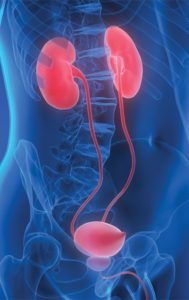By Dr. Eric Coronato, Board-Certified Urologist


Gross hematuria is when the blood in the urine is visible to the human eye, and microscopic hematuria is when it’s only detectable under a microscope. In the majority of patients with hematuria, the bleeding comes from the ureters, bladder or urethra.
The Causes of Hematuria Could Be
the Following:
• Eating red colored foods like beets or berries
• Strenuous exercise
• Urinary tract infection
• Certain medications
• Kidney infections
• Bladder or kidney stones
• Overactive bladder
• Sickle cell anemia or other hereditary disorders
• Enlarged prostate
• Tumors
• Cancer
No matter what the cause, it’s imperative to see your physician if you notice blood in your urine to rule out severe disorders and to get you the treatment you need. Even if you have something as common as a urinary tract infection, it must be treated, or the bacterial infection can spread into your kidneys, which can be fatal.
Your physician will order blood tests and a urinalysis. If other testing is needed, depending on the initial findings, they may request a CT scan, renal ultrasound, X-rays, intravenous urography or a biopsy.
Microscopic hematuria is also of concern for the conditions mentioned above, as 3% of patients undergoing a routine urinalysis will have urological cancers. The number is, of course, higher in those with gross hematuria.
What if I have an advanced diagnosis?
Not all hematuria leads to cancer, but in some cases bladder cancer and urothelial cancer is diagnosed with advanced testing. Bladder cancer is the 5th most prevalent cancer. Bladder cancer usually forms in the urothelium layer of the bladder. Upon diagnostic testing, tumors are discovered in the bladder. Most of these tumors are considered low-grade, which is, fortunately, easier to treat. The low-grade tumors take on the appearance of a small broccoli floret and are typically cut out and removed completely. In addition the same type of urothelium layer lines the ureters and the inside of each kidney and thus cancer can form in these areas as well.
In the office, Dr. Coronato uses a cystoscopy, which is a flexible scope that is inserted into the bladder to check for any signs of cancer. If the tumors are in a low stage, non-papillary, and they haven’t grown through the bladder wall, they can usually be removed fairly easily. This procedure may be done in the office but is often done under anesthesia in a hospital or surgical center as it is far more comfortable and may allow for a more complete removal of the tumor.
CT scans and ultrasound technology are other viable imaging systems to show intricate detail of the bladder and the type of cancer that has invaded the patient’s urothelium or beyond.
In patient with more high grade cancers, bladder instillation treatments may be necessary to kill any residual roots or cancer cells that could not be removed during the procedure. Immunotherapy shows promising results in warding off recurring types of cancer. BCG (Bacille Camille Guerin) is the most commonly used bladder cancer treatment and involves placing a temporary catheter in your bladder to allow placement of the medicine into the bladder. This is typically done in weekly intervals for a total of 6 weeks. While having been used for the past 50 years, BCG still remains the primary treatment method for high grade bladder cancers. More advanced forms of bladder cancer may require surgical removal of the bladder which is why it is crucial to ensure a patient continues to follow up with their urologist at regularly scheduled intervals. Individuals with bladder cancer have a 50% chance of recurrence. Therefore, it’s imperative that patients are monitored every three months for up to two years after their initial diagnosis and treatment.
It’s Essential To Be Proactive! If You Have Any Urological Symptoms, Pain Or Blood In Your Urine, Contact Your Physician Today!
Gulf Coast Urology – A Division of 21st Century Oncology – is a fully integrated, breakthrough urological care facility. Their patients are able to visit their neighborhood physician and also obtain streamlined access to pathology, laboratory, radiation and imaging services. By having these services readily available, they can more effectively manage their patient’s health care as a whole, while ensuring they receive the highest standard of quality.
The board-certified physicians and clinical staff are experts in the latest advances in urological care and are leaders in bringing new technology and treatment options to our community. They treat all urologic diseases and conditions, including enlargement of the prostate causing lower urinary tract symptoms, prostate cancer screenings and treatments, urinary incontinence, changes in voiding habits, overactive bladder, painful urination, excessive nighttime urination disrupting sleep cycle, urinary tract infections, blood in the urine, elevated PSA, kidney and bladder stones, sexual dysfunction including impotence, vasectomy and cancers of the kidney, bladder, ureter, testicles and more.
About
Eric E. Coronato, D.O
Dr. Eric Coronato received his degree from New York College of Osteopathic Medicine, completed his internship in Massachusetts and his Urology residency at Albert Einstein
Medical Center in Philadelphia and has been practicing in Florida since 2010.
If you or someone you know may be at risk please schedule your urology appointment today, please call (941) 625-1550.
Gulf Cost Urology
21260 Olean Boulevard
Suite 202A
Port Charlotte FL 33952
941-625-1550
www.gcurology21c.com
 Southwest Florida's Health and Wellness Magazine Health and Wellness Articles
Southwest Florida's Health and Wellness Magazine Health and Wellness Articles

